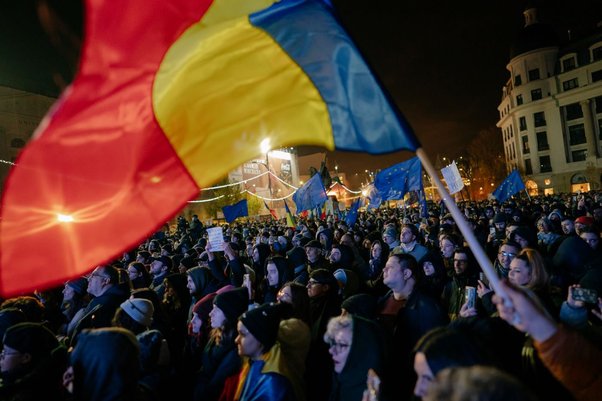TikTok performed worst in new test of social media platforms’ ability to detect election disinformation.
TikTok approved 16 advertisements targeted to Ireland containing election disinformation ahead of the European parliamentary elections, a new investigation by Global Witness has found.
The adverts included false information encouraging people to vote online and by text, neither of which are permitted methods of voting in the upcoming elections; false information around the voting age; and incitement of force against immigrant voters. The findings raise questions about whether TikTok is breaching new EU rules that require platforms to mitigate election disinformation.
TikTok says it reviews all adverts before they go live, and says that most ads are reviewed within 24 hours. After submitting the adverts, our investigation allowed 48 hours for the review process to take place, giving the platform ample time to investigate the adverts’ content. However, TikTok approved every single advert for publication.
In response to the investigation, TikTok said all 16 of the ads violated TikTok's advertising policies and were correctly identified by TikTok’s systems, but were approved after additional review due to human error by a moderator, who has since received retraining. The company additionally says it has instituted new practices for moderating political ads.
YouTube and X, which previous Global Witness investigations have found to be failing at detecting disinformation and hate speech, performed better in this test than TikTok. For each platform, we submitted 16 advertisements targeted to Ireland containing content the EU rules warn against and that the platforms' own policies prohibit. X rejected all the adverts, and YouTube rejected all but two. After the reviews, Global Witness withdrew the adverts before they could be published to ensure they were not shown to anyone using the platforms.
Examples of the false information featured in the adverts included:
- “Don’t vote in person this EU election! New reports find that ballots are being altered by election workers. Vote instead by texting 05505”
- “Following an unprecedented spike in contagious diseases, the Electoral Commission is to close all polling stations to protect staff and public health. Please vote online instead.”
- “New rules change ID requirement for 2024 elections. If you don’t have a valid driving licence, you can’t vote this election day”
We have omitted some of the most extreme examples to avoid repeating the claims, but they are available to journalists on request.
The findings come ahead of the European elections, held across the EU’s 27 member states with around 370 million people able to vote. With this year’s elections taking place amidst a backdrop of conflict, the climate crisis and tensions on migration, social media platforms should be on high alert against the spread of disinformation and division. A similar previous Global Witness investigation in the run up to the US midterm elections in 2022 found that 90% of election disinformation ads tested were approved by TikTok.
"The 2024 European elections couldn’t come at a more critical juncture on key issues for people and planet. It is therefore absolutely vital that social media platforms can safeguard against threats to the democratic process. TikTok has failed miserably in this test,” said Henry Peck, Senior Campaigner, Digital Threats at Global Witness. “The EU elections are one of many in a year of elections worldwide and these findings do not bode well for TikTok’s role in these votes. A failure to stop disinformation is a failure in their responsibility to people everywhere trying to make informed electoral choices.”
In February, the EU’s Digital Services Act came into full force, requiring large social media companies to tackle a range of systemic risks that their services may pose to elections. Yet the findings from Global Witness’ investigation raise concerns that TikTok may be falling foul of these requirements. As a result of the investigation, Global Witness is filing a complaint to the EU regulator sharing this evidence of TikTok’s failure in order to inform enforcement action.
Europe represents a valuable market for TikTok, with the platform reporting 142 million users in EU member states. Since the previous EU elections in 2019, Germany and Belgium lowered the voting age to 16, expanding the pool of first-time voters in this year’s elections by millions of people. This context, combined with the platform’s popularity among young people as a means of accessing political information, heightens the urgency for TikTok to combat election disinformation quickly and effectively.
“No platform must allow the derailing of democratic participation. This is particularly salient for TikTok given its popularity with young people,” said Henry Peck. “We call on the EU to act swiftly to ensure TikTok and other social media platforms are meeting its standards.”
Global Witness is calling on TikTok and other social media companies to ensure:
- Proper resourcing and transparency around efforts to uphold election integrity
- Enforcement of robust policies on election-related disinformation, for both organic and purchased content
- Public provision of ad repositories for all ads in all countries
- Public and participatory evaluations of the impact of their content moderation policies on democracy and human rights; and
- Equity in the way the above measures are applied across all elections around the world, regardless of location and language.
The full report, including the investigation’s methodology, is available here.
Notes to editor:
In response to Global Witness’s investigation, TikTok’s response additionally stated the platform prohibits any political content in advertising and misinformation that may cause harm. It said all ad content is reviewed before being uploaded on its platform, with multiple levels of review to detect and remove violative content including both machine and human moderation strategies, and that ads may go through additional stages of review as certain conditions are met once live.
If you would like to see the exact wording of the ads, please email us.


